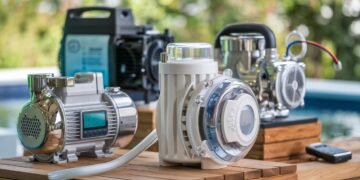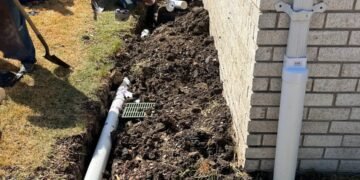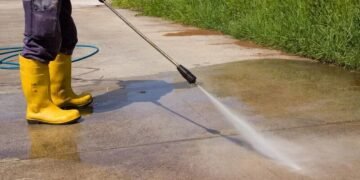Are you one of those people who find cleaning therapeutic and satisfying? Do you love the feeling of a clean and organized space? If so, you’re in the right place!
In this article, we’ll talk about one of the most satisfying cleaning tasks you can take on: cleaning your pool. Nothing beats the feeling of seeing crystal-clear water and sparkling tiles after a good scrubbing session.
And the best part is, you don’t need fancy or expensive products to achieve it. You can transform your pool from a murky mess into a pristine oasis with just a few household items.
So grab your gloves, put on some music, and let’s get cleaning! Get ready to feel the rush of satisfaction and accomplishment that only comes from cleaning to perfection. Trust us; your pool will thank you for it!
Six Household Products to Clean Your Pool Properly
1. Lemon Juice
Did you know you can use lemon juice to help clean your pool? Lemon juice is a natural acid that removes stains and brightens pool surfaces.
If stubborn stains won’t come off, cut a lemon in half and rub it on the affected area. Alternatively, you can mix lemon juice with baking soda to make a paste and then apply it to the area that needs cleaning.
While it’s important to note that lemon juice isn’t typically used as a primary cleaning solution for pools, it can be a useful tool in certain situations. Here’s how you can use lemon juice to clean your pool:
- Squeeze the juice from several lemons into a spray bottle.
- Spray the lemon juice directly onto the stains or buildup on the pool surface.
- Let the lemon juice sit for several minutes to dissolve the stains.
- Use a brush or sponge to scrub the surfaces.
- Rinse the surfaces thoroughly with water.
The benefits of using lemon juice as a pool cleaner are that it is an all-natural and eco-friendly alternative to harsh chemicals and can be effective at removing specific types of stains and buildup.
Furthermore, lemon juice has a fresh and pleasant scent that can leave your pool smelling clean and inviting. However, it is crucial to note that lemon juice should not be used in excessive amounts or regularly, as it can lower the pH level of the water and cause damage to the pool surfaces if not properly diluted or balanced.
2. Baking Soda
Baking soda is a mild alkali that can help to remove stains and balance your pool water. Simply sprinkle baking soda on a damp sponge or brush and scrub away.
- Test the pH level of your pool water using a test strip or kit.
- If the pH level is below 7.2, add 1.5 pounds of baking soda per 10,000 gallons of water. If the pH level is above 7.8, add 3 pounds of baking soda per 10,000 gallons of water.
- Turn on the pool pump to circulate the water and let the baking soda dissolve for several hours.
- Retest the pH level and adjust as needed.
Baking soda is a popular pool cleaner because it can help maintain the pool water’s pH level.
When the pH level is too low, the water becomes acidic, irritating the eyes and skin, corroding metal surfaces, and damaging pool equipment. When the pH level is too high, the water becomes alkaline, which can cause scaling and cloudy water.
Baking soda, a mild alkali, can help raise the pH level and neutralize the acidity of the water without causing harm to the pool or swimmers. Now you can ask does baking soda neutralizes chlorine. No, it does not! But it does help regulate the pH level of water.
It is also safe and non-toxic, making it an eco-friendly and affordable option for pool maintenance.
3. Bleach
If baking soda does not work for you, bleach may be the answer! Bleach is a chemical compound commonly used as a disinfectant and cleaner. It is typically made from sodium hypochlorite, a strong oxidizing agent that can kill bacteria, viruses, and algae.
Bleach is indeed used to clean pools, as it can be an effective way to disinfect and sanitize the water. By adding a small amount of bleach to the pool, you can kill harmful microorganisms and prevent the growth of algae, which can cause the water to become cloudy or green. Bleach also removes stains from pool surfaces, such as rust or mildew.
One of the key benefits of using bleach to clean your pool is that it is a powerful disinfectant that can kill many pathogens. This can help to keep the water safe and healthy for swimmers. Additionally, bleach is readily available and relatively inexpensive, which makes it a convenient and cost-effective cleaning solution.
However, it is essential to note that bleach should be used in moderation, as it can cause skin and eye irritation and can be corrosive to pool equipment if not properly diluted.
It is also essential to test the pH level of the water after adding bleach, as it can increase the pH level and cause scaling or cloudiness if not appropriately balanced.
4. Vinegar
Vinegar is a versatile cleaner that can dissolve mineral deposits and eliminate bacteria and algae. Mix equal parts of water and vinegar and use a spray bottle to apply the solution to the pool surfaces. Let it sit for a few minutes before rinsing off.
To use vinegar to clean your pool, you can follow these steps:
- Mix equal parts of water and white vinegar in a spray bottle.
- Spray the solution on the pool surfaces, such as the tiles, walls, and steps.
- Let the solution sit for a few minutes to dissolve mineral deposits or algae.
- Scrub the surfaces with a brush or sponge to remove any stains or buildup.
- Rinse the surfaces thoroughly with water and have a clean pool!
Vinegar is a recommended pool cleaner for several reasons. Firstly, vinegar is an eco-friendly and non-toxic alternative to harsh chemicals that can harm the environment, pool equipment, and swimmers.
Secondly, vinegar is a natural acid that can dissolve mineral deposits, dirt, and algae from pool surfaces. This makes it an excellent solution for removing stubborn stains or buildup that can accumulate over time.
Lastly, vinegar is readily available and affordable, making it a cost-effective pool maintenance option.
However, it is crucial to note that vinegar should not be used in excessive amounts or without proper dilution, as it can lower the pH level of the water and cause damage to the pool surfaces.
5. Hydrogen Peroxide
Have you heard of using hydrogen peroxide to maintain your pool water? That’s right! It’s a great eco-friendly alternative to harsh chemicals and can work wonders to keep your pool clean and clear.
Hydrogen peroxide is an oxidizing agent that can break down organic matter in your pool water and eliminate contaminants and bacteria that can make your pool water cloudy or discolored. It’s particularly effective for removing oils, lotions, and other substances that can build up on the water’s surface.
To use hydrogen peroxide in your pool, it is essential to dilute it properly and not use too much. Adding too much hydrogen peroxide can cause the water to become cloudy or even foamy, which can be challenging to clear up. It is also essential to test the pH and alkalinity levels of the water before and after adding hydrogen peroxide, as it can affect the balance of the water.
While hydrogen peroxide can be a useful addition to your pool maintenance routine, it should not be relied upon as a sole cleaning solution. It is still important to regularly clean and maintain your pool with other cleaning products and methods to ensure the water stays safe and healthy for swimmers.
6. Dish Soap
Lastly, dish soap! Dish soap is a versatile cleaning product that can be used for various tasks around the home, including cleaning a pool. While it is not typically recommended as a primary cleaning solution for pools, it can be useful for certain aspects of pool maintenance.
For example, dish soap can be used to remove oils and lotions that have accumulated on the surface of the water. A small amount of dish soap can be added to the water and then gently scrubbed with a soft-bristled brush to help break down the oils.
Dish soap can also be used to clean pool toys and covers by mixing them with water and using a sponge or brush to clean the surfaces. However, it is important to note that dish soap should not be relied upon as the sole cleaning solution for a pool.
It can cause the water to become soapy and can be challenging to clear up if not used properly. It is still important to regularly clean and maintain your pool with other cleaning products and methods to ensure the water stays safe and healthy for swimmers.
Conclusion
As you can see, there are many household products that you can use to clean your swimming pool effectively and affordably.
Whether you prefer natural cleaners like vinegar and lemon juice or powerful disinfectants like bleach and hydrogen peroxide, there’s a cleaning solution for every pool maintenance need.
These products are readily available and budget-friendly and offer an eco-friendly alternative to harsh chemicals that can harm the environment and your health.
You’ll enjoy a sparkling and safe swimming experience and the satisfaction of using household items to solve a problem. So dive in and enjoy your clean pool!
Recommended Posts:
















